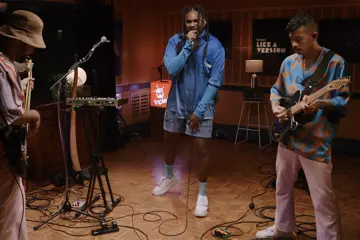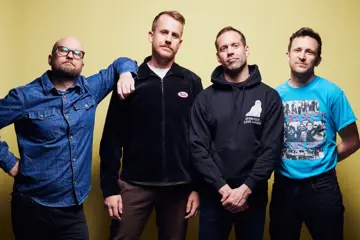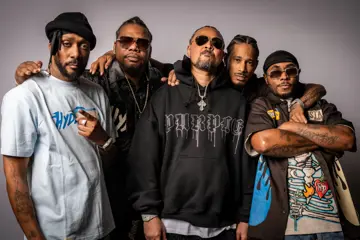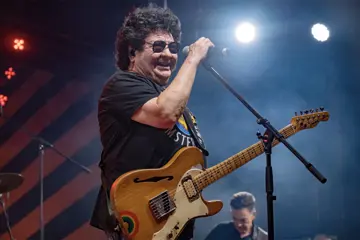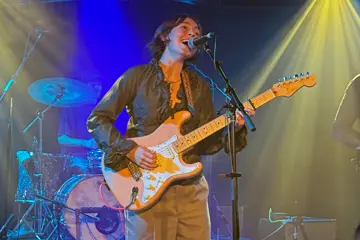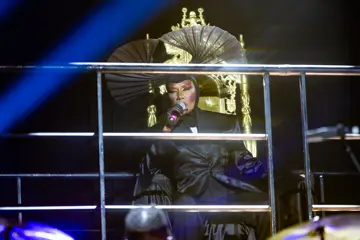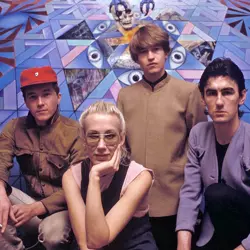 The Go-Betweens
The Go-BetweensThere have been a lot of great albums to emerge from Brisbane since the beginning of the rock'n'roll era, and from a purely artistic perspective The Go-Betweens' 1988 sixth effort 16 Lovers Lane must be considered up there with the finest to ever have emanated from the Queensland capital.
Despite housing brilliant and enduring singles Streets Of Your Town, Was There Anything I Could Do? and Love Goes On, the record didn't make any significant commercial inroads at the time - sadly none of the legendary band's albums ever really did - but 16 Lovers Lane nonetheless remains a timeless Australian classic.
Now under the auspices of Queensland Music Festival, three original members of the The Go-Betweens who featured on the album - Lindy Morrison, Amanda Brown and John Willsteed - are revisiting 16 Lovers Lane to reinterpret it in a contemporary construct.
To assist, they've enlisted a stellar line-up of guest musicians and an array of guest vocalists including Steve Kilbey (The Church), Mark Callaghan (The Riptides, GANGgajang) and Ron S Peno (Died Pretty), who will all bring their own unique flourishes to the beautiful collection of songs.
Don't miss a beat with our FREE daily newsletter
"I'm really looking forward to playing those songs again, and particularly interested in hearing how the various singers interpret them," Brown enthuses. "We won't be straying too far away from the original arrangements, because I think people will enjoy the opportunity to hear them after 30 years - or nearly 30 years - but I'm sure the singers will bring their own things to the songs as well.
"It literally took months to put together because the original remaining members - Lindy, John and myself - curated all those artists, and we had a rule that we wanted people who had a strong connection to the band or the musicians in the band or the music of The Go-Betweens, and preferably with a Queensland focus. We also tried to pick singers and match them with the songs that we thought they could really bring something to."
It's always an array of intangible factors that make an album special in the long run, but Brown recalls realising that the band's two frontmen and songwriters - Robert Forster and his good friend Grant McLennan, who tragically passed away in 2006 - were both at the top of their respective games when bringing the band their contributions for 16 Lovers Lane.
"Without sounding like a total egomaniac, I knew it was a very strong collection of songs," she laughs. "And because the nature of the set-up of the band was two songwriters, it meant that we had a very strict rule that they'd always have an equal number of songs on every album. So they were kind of continuously competing and intellectually sparring with each other, and I think that produced some great work.
"And it also meant that each songwriter only had five songs each on the album, so it was their five absolute best songs, so the quality was there. And I think Lindy and I were quite harsh critics and weren't afraid to say if something was weak or had a bad lyric or needed work on the arranging.
"It was very collaborative, they'd bring in the bones of the songs and the band would arrange the songs. So when we had John Willsteed on board for that album, for example, he brought a lot of those very pretty, melodic nylon-string and acoustic guitar melodies: that's him playing the guitar solo on Streets Of Your Town, and also the bass on that song which is quite melodic because he's not actually a bass player and he played that bass part on a Stratocaster through an octave pedal. It gives it that really quite distinctive sound, which is a great sound but not your typical bass part."
Willsteed - who'd just joined the band prior to the album's creation - also has fond memories of the album's genesis.
"I got a lot of joy out of just sitting there with Robert just playing acoustic guitar beds for the songs and stuff like that - I love playing music and I love making music, so I got to do a fair bit of it on that record," he reflects. "And that's one of the things that actually drew me to the idea of doing it live, having the opportunity to kind of revisit some of those bits and pieces that were layered into the album.
"The album is quite dense in many ways, even though it has a lightness and a shimmery-ness about it, that is something that is deceptively made up of a lot of parts. A bit like how a spider's web is a delicate thing made of gossamer, but in fact there's a lot of complexity and intricateness in how it's constructed."
Willsteed also firmly believes that it's imperative that events like this help Brisbane embrace and reconnect with its rich cultural heritage.
"I want to be very careful about the fact that it's not a nostalgic thing," he stresses. "I think it's very important for us to be constantly reiterating our cultural past because it's so easily forgotten. There's a lot of noise in the world - there's an enormous amount of media out there and music from all sorts of times - and I think that Brisbane has never had a good relationship with its own past. We do it with buildings and we do it with culture, we knock stuff down and we just forget all about it.
"So I feel like things like this [tribute] are very important, and that's what my work is these days - it's my academic work at university, I write about this stuff and I'm constantly looking at the past and trying to find ways of reinvigorating our history and putting it in new stories so that people can get an understanding of what a great history we actually live in right here, and that it's not all about little Alfie Langer and Wally Lewis. God love 'em, but there's so much more to Brisbane than football."




